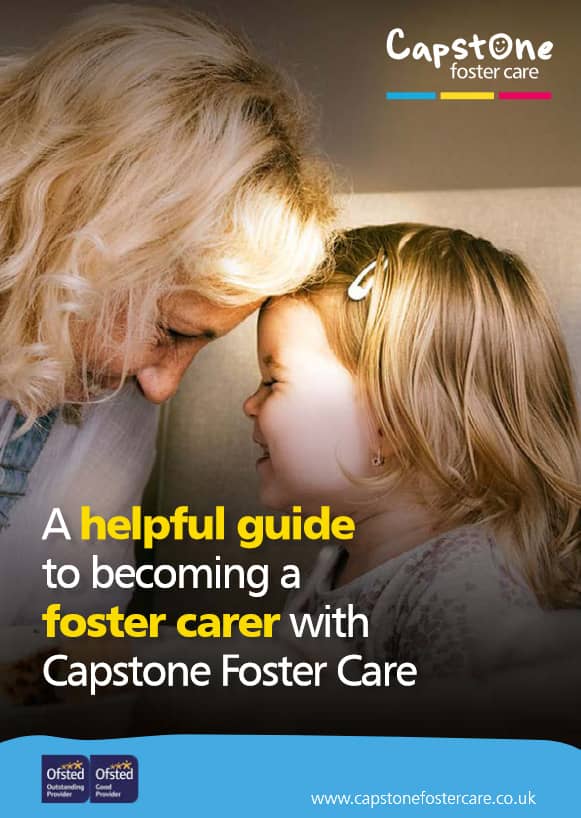


Fostering a disabled child
The role of an independent fostering agency
How to choose a foster care agency
Can I choose who I foster?
What are the benefits of fostering with an independent fostering agency?
What happens when a child is taken into care?
Fostering process: what happens on an initial home visit?
Fostering with local authority vs independent agency
A complete guide to becoming a foster carer
How Are Children in Foster Care Matched with Carers?
Foster Care Budgeting Tips
Becoming A Foster Carer
What is a Care Leaver?
What is a Foster Carer?
Fostering Regulations
How long does it take to become a Foster Carer?
What are the Foster Care requirements?
Changing IFA - Transferring to Capstone
8 reasons why a child may be taken into care
Fostering as a Career
Can you foster if you smoke or vape?
A guide to fostering assessments
LGBTQ+ Fostering
Equality, Inclusion & Anti-discriminatory Practice in Foster Care
What can disqualify you from foster care?
Can you foster if you’re on benefits?
Top transferable job skills to become a foster carer
Fostering as a same sex couple
Fostering while renting
Can you foster if you have mental health issues?
Is there an age limit for fostering in the UK?
Do foster carers get a pension?
How to foster a child: A step by step guide
How do DBS Checks Work?
Can I foster if...?
Mythbusting the top 10 Foster Care Myths
Can I foster if I am disabled?
LGBT Fostering Mythbusting
Can I foster if I have pets?
Can I Foster A Child?
Can I Foster and Work?
Can you Foster with a Criminal Record
Can Single People Foster?
LGBT Family and Foster Care
Fostering across Cultures
Muslim Fostering
Christian Foster Care
Sikh Fostering
Empty Nest Syndrome and Foster Care
Can I Foster?
What is the difference between residential care and foster care?
Fostering Babies and Young Children
What is Kinship Care?
Fostering Babies - Myths
Focusing on Parent & Child Fostering
Fostering Siblings
Fostering Teenagers
Fostering Teenagers - Breaking down the Myths
Fostering Unaccompanied and Asylum Seeking Children
Mother and Baby Foster Placements
Private Fostering
How does therapeutic fostering work?
Young Children Fostering Placements
Difference between short and long-term fostering
Types of self-harm
A Guide to the Foster Care Handbook
Reunification and Birth Parents: A Guide for Foster Carers
What is an EHC Plan? A Guide for Foster Carers
How to prepare a child for becoming a care leaver
Children who foster: impact of fostering on birth children
Fostering LGBTQ+ Youth
How to prepare your home for a foster child
How to help a lonely child: A Guide for Foster Carers
What are the National Minimum Standards for Fostering Services?
10 tips for foster children's education
How to prepare your foster child for secondary school
Tips for coping when foster placements end
Tips for foster parents during Coronavirus
What happens if foster parents get divorced?
5 ways to manage Mother's Day with foster children
Tips for managing foster children's bedtime routines
How to handle foster child bullying
Fostering allowances and the gender pay gap
What discounts can foster carers get?
How to adopt from Foster Care
5 ways to manage Father's Day for children in foster care
8 most common fostering challenges
FosterTalk Membership with Capstone Foster Care
Supporting foster children's contact with birth families
A guide to independent fostering
Keeping Children Safe Online: A Guide For Foster Carers
Movies About Foster Care
Play-based learning strategies for foster carers
A Guide to the Staying Put Program
Why Foster Parent Wellbeing Matters
How to deal with empty nest syndrome
How to recognise signs of depression in foster children
Can you take a foster child on holiday?
Tips and advice on fostering with a disability
10 tips on connecting with your Foster Child
Fostering vs Adoption - What's the difference?
How Fostering can change a future
How to adopt from Foster Care
How to encourage children to read in Foster Care
How to prepare a Foster Child's bedroom
Reading and Storytelling with Babies and Young Children
Supporting Children's Learning
The 20 most recommended books Foster Carers and young people should read
Things you can do when your children leave home
The impact of early childhood traumas on adolescence and adulthood
Anxious Disorders in Foster Children
What is sexual abuse and sexual violence
Foster Child behaviour management strategies
Foster Parent Advice: What to expect in your first year of fostering
Capstone's twelve tips at Christmas
10 celebrities who grew up in Foster Care
Could Millenials be the solution to the Foster Care crisis?
Do you work in Emergency Services?
Form F Assessor and Assessment Training
Foster Care Fortnight
Improving Children's Welfare - Celebrating Universal Children's Day
New Year - New Career - Become a Foster Carer
Young People Charities
The National Minimum Standards for fostering covers a comprehensive range of standards aimed at ensuring the welfare, safety and needs of foster children are at the heart of foster care.
The National Fostering Minimum Standards are designed to consider your foster child’s wishes and feelings and covers:
The standards additionally provide specific guidance within the fostering service itself, including:
There are 31 standards in total, and they each outline the expected outcomes for children in foster care as well as the criteria fostering services and carers must meet to achieve these outcomes.
The National Minimum Standards are designed with the child in mind; however, they are intended to be used by Fostering Services and Ofsted inspectors as well as providing a guide for foster carers, children in foster care and their families in order to understand the level of care that should be provided.
Standards 1-12 of the National Minimum Standards for Fostering are centred around your foster child’s thoughts, feelings, and personal development. Foster carers should focus on these standards to support a child in foster care effectively.
The National Fostering Minimum Standards aim to support your foster child's emotional and social development while ensuring their safety and well-being. It also outlines the importance of supporting contact with your foster child’s family, if it is safe to do so. Balancing the child’s need for safety and protection with the benefits of maintaining positive relationships with the child’s birth family and significant others.
The standards help children develop a sense of personal safety by providing a suitable physical environment. It advises that children over the age of three should have their own bedroom. This is to establish their privacy and own personal space to contribute to their growing need for independence.
Other important issues that are raised within the National Minimum Standards include supporting foster children with their education, and safeguarding and preparing older children for independence and adulthood.
The standards from 13-31 deal with the operational, management and regulatory aspects of fostering. This includes establishing expectations for fostering agencies, like us here at Capstone Foster Care, as well as local authorities and social workers.
The guidance outlines specific criteria for assessing foster carers, such as background checks, personal references, health checks and home environment to ensure that children in foster care are matched with a safe, loving, nurturing and supportive environment.
Based on the standard practices in foster care services outlined in the National Minimum Standards, foster carers typically need to undergo a range of training designed to prepare them for the challenges and responsibilities of fostering.
The standards also outline that foster carers should receive financial support as a maintenance allowance and as a professional fee, and this should be paid fairly and on time.
Here at Capstone, we’re proud to go above and beyond the National Minimum Standards of fostering. We are also able to offer competitive rates for our fostering placements. As well as being here to offer you support at every step of your fostering journey.
Your training will begin with our “Skills to Foster” course which is designed to help you to develop the skills to meet the needs of children in care. And, while you’re fostering with us, you’ll also receive ongoing support, training and development to build skills and knowledge to meet the evolving needs of children in care.
Ready to begin fostering? Get in touch today or download a brochure to find out more.
If you’ve got any questions or would like to find out more about fostering with Capstone, fill out the form below.
An experienced fostering advisor from your local area will then be in touch.

Start the conversation today. Our team of friendly advisors are on hand to answer any foster care questions you may have. We can offer you honest and practical advice that can help you decide if becoming a foster carer is the right path for you.


